What Makes the Western Slope League Feel Like Family?
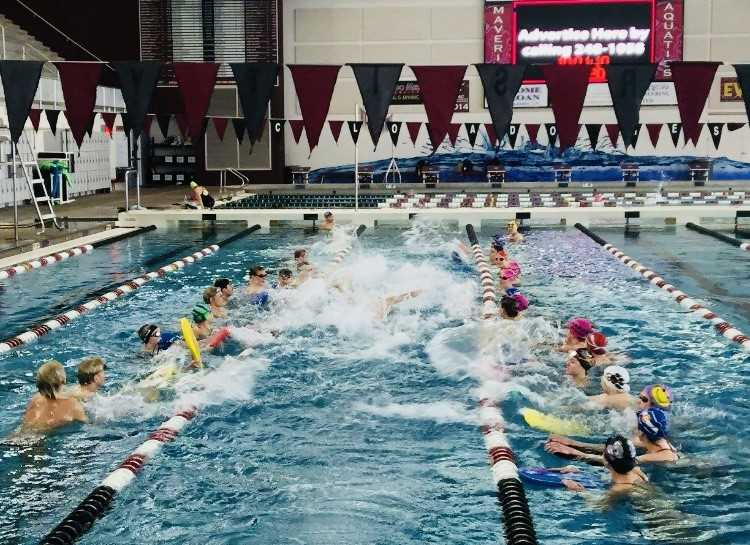
Commentary by Bailey Duran, Swimming World Intern.
The Colorado Western Slope League is a small swim league in Western Colorado that takes its swim community to another level. Gordon Gerson, coach of the Aspen Swim Club, says the Western Slope League is unique because it “covers a lot of square miles with a lot of small teams. There are year-round teams with national-caliber swimmers in combination with a lot of summer teams as well. Our goal is to promote the sport to the benefit of all from that very diverse set of teams.”
The Western Slope is different from other leagues because all of the teams work together to help the league as a whole and each other to be successful.
Products of a Tight-Knit League
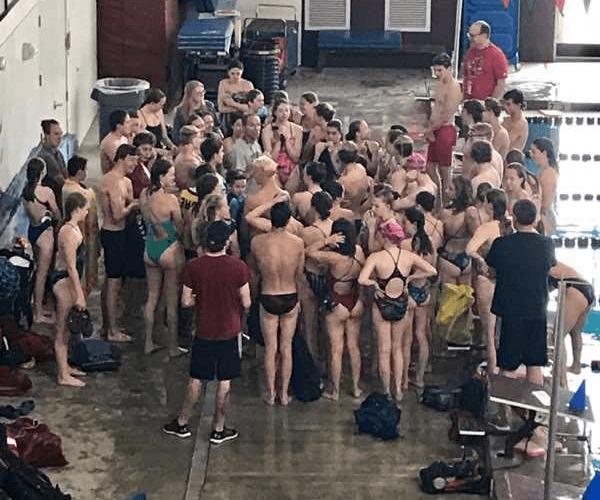
Photo Courtesy: Bailey Duran
Although the league is small, its members are diverse. Those who qualified for the Olympic Trials train alongside summer-leaguers, and many swimmers from the Western Slope League have gone on to compete for a variety of colleges, including Harvard, the Air Force and the Coast Guard to name a few.
Because most of the teams are small, some coaches wanted their athletes to get exposure to practicing with more kids, other coaching styles, and making friends with other swimmers in the league. Thus, Peak Week Training Camp was created.
Peak Week Training Camp
The camp was established in the early ’90s by coaches Dale Leonhart, Chuck Cary and Silas Almgren. Almgren – who has been coaching for 29 years and currently coaches the Montrose Marlins – is still involved in the camp today.
Peak Week Camp had humble beginnings in Summit, Colorado but now takes place at Colorado Mesa University in Grand Junction, Colorado. The camp has been in Grand Junction for six years and is now offered during the winter in addition to summer to break up the monotony of holiday swimming.
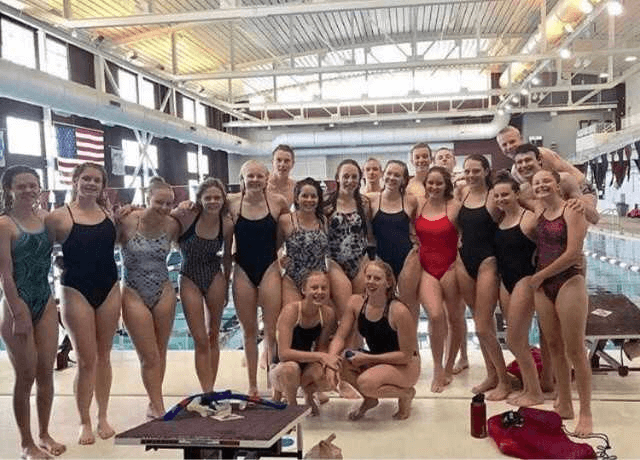
Photo Courtesy: Bailey Duran
Cole Peterson, a 17-year-old swimmer from Aspen Swim Club, has attended a total of nine camp sessions so far in his swimming career and has been forever changed by his experiences:
These camps are a unique opportunity for me and other swimmers from the entire western half of Colorado to train as a collective group, rather than as separate teams. We push each other to do better as teammates rather than competitors. Some of the best coaches from around the state come together to combine training methods and offer unique advice to every swimmer at the camp. They give a week of their lives to coaching swimmers they may barely know and may not swim for their teams. The sets and practices are often grueling, but when you look across the pool and see everyone else going through the same pain, it makes you train harder and brings the group closer. I’ve personally met some of my best friends at these camps. Ultimately, after five days, we are in much better shape (albeit utterly exhausted), we’ve made new friends, and we’ve become better swimmers. It’s a huge effort on the part of the Western Slope League and its incredible coordinators. The fact that the league is so small but so invested in their athletes is crazy, and I wouldn’t be where I am today without its support and commitment.
Suzi King, one of the coordinators, has been helping to organize the camp since 2009. She points out that because of the collaboration of teams and coaches at the camp, these 60-plus swimmers become like a big team at meets, cheering each other on and celebrating each others’ accomplishments.
Peak Week became possible because the Western Slope League and Colorado Swimming contribute $5,000 to the camp every year so that swimmers can attend camp without having to pay astronomical fees.
Swimmers stay in the dorms at CMU with access to an amazing coaching staff, state-of-the-art recreation facilities, and nightly activities. Some of these events including the following: movie night, scavenger hunts, a trampoline park, bowling, laser tag, rock climbing, and river rafting.
Why Coaches and Athletes Alike Love Camp
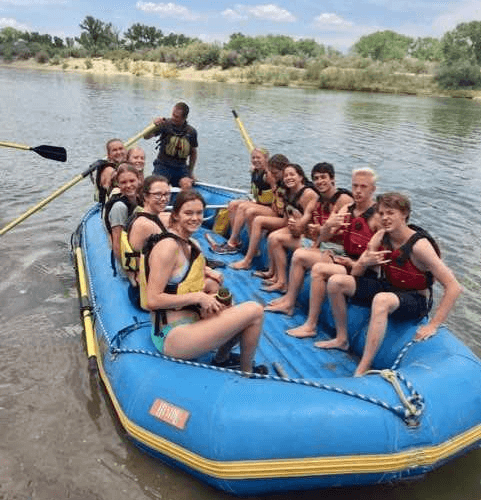
Photo Courtesy: Pam Christianson
Coach Martinek of Durango Swim Club says, “I love that it brings all these teams together that compete and allows them to step up in practice to race the kids they compete against at meets. I love that kids hear feedback from different coaches. I think it helps with the process of learning.”
The coaches at this camp are volunteers: they do not get paid extra to conduct this camp. However, their investment pays out through learning from the other coaches and helping all the swimmers become the best that they can be. Coach Martinek’s advice for his swimmers is this: “Be patient, work hard, and it’s going to pay off.”
Fourteen-year old McKenzie Rion from Durango Swim Club has been swimming for seven years and swam at her first camp this year. She said, “I love the swimmers on the Western Slope League. Everyone is so supportive of each other and wants everyone to succeed.” She also pointed out that she was able to learn so much from the other coaches and that their different styles and approaches helped her learn why it is so important to work hard in practice.
Rion also said, “the coaches at camp have influenced my swimming exponentially. They have all taught me to swim with purpose.”
What Coach Almgren loves most about this camp is that “we [the coaches] can bring kids and coaches together and genuinely collaborate. We want the best from the swimmers and are not guarded to share ideas between coaches and their athletes. We share collectively in everyone’s successes.”
Emily Driscoll, an 18-year-old swimmer from Aspen Swim Club, says: “Camp is a rare opportunity for all of the swimmers of the Western Slope to bond. The Western Slope is like one big family.”
Coach Gerson says that this camp is different from most other swim camps, because most other camps are technique-focused, while “this camp focuses on both technique and a peak training experience. We also believe there should be a lot of fun, so ultimate frisbee, trampoline park, movies and laser tag are regular staples. More recently, rafting, roller skating and climbing walls have made an appearance.”
Swimming to the Next Level Together: One Big Family
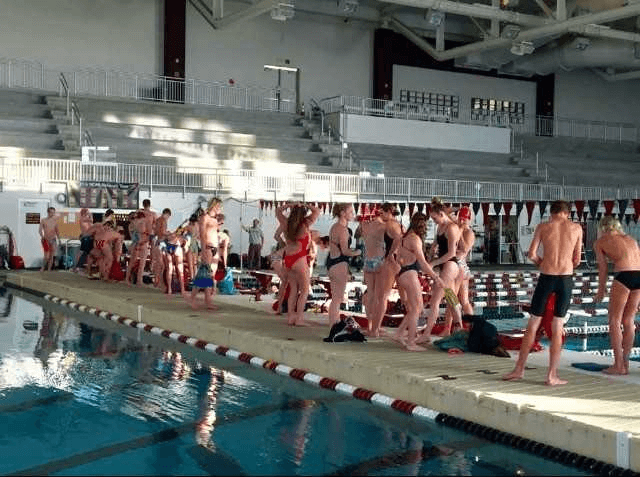
Photo Courtesy: Western Slope League
At Peak Week, swimmers also get the opportunity to push themselves beyond what they thought they could do with the encouragement and instruction of the camp’s coaches.
Peterson said that the biggest thing that he has taken away from camp is that you leave knowing you are capable of more than you think:
The third day is usually when exhaustion starts to kick in, so the coaches usually write the hardest set for that day. There’s a point where your brain tells your body that it can’t go any harder; that it just isn’t happening today. And then you see someone else right beside you and think, ‘Okay, if they can do it, I can do it.’ You push yourself harder. Your brain will try to stop you long before your body is ready, and it’s hard to figure that out unless you push past it. The camp gives people the opportunity to do more than they think they can, which I find to be an extremely valuable experience.
Not only do they train hard to be able to swim faster, but they also make friends with other swimmers in the league. These friendships don’t just stay at camp, either. It is not uncommon to see a Western Slope swimmer racing at a big meet with swimmers from Durango, Aspen, Montrose, Cortez, and Grand Junction all cheering them on and congratulating them afterwards. The swimmers also know that they can talk to any of the coaches to get pointers.
Learning Life Lessons from Coaches
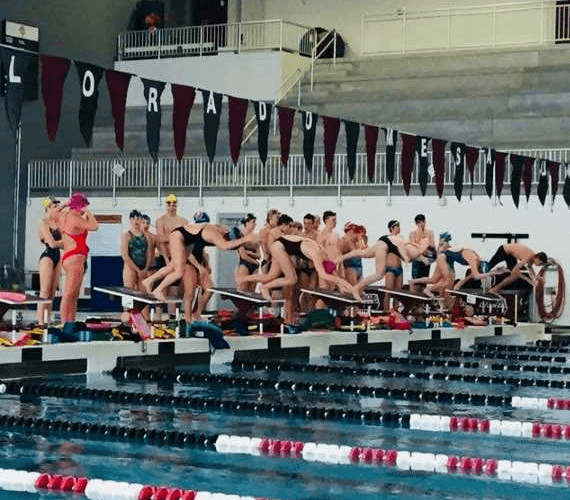
Photo Courtesy: Western Slope League
A common thread of swimmers’ experience at camp is respect and admiration for the coaching staff – not just for their swimming knowledge but also for their perspective. Coach Gerson says he reminds his swimmers of this key factor: “Believe in the process, and you will become the best swimmer and the best person you can be.”
Sixteen-year-old Cortez Leopard Shark swimmer Tyler Cutrone adds: “The coaches who host the camp are amazing. They don’t just teach me how to be better at swimming, but they teach important life skills: self-drive, motivation, hard work and dedication.” Cutrone also says that the camp adds motivation back into his swimming when he is beginning to feel burnt out.
Cayden Christianson, a 17-year old swimmer from the Montrose Marlins, has been coming to camp ever since he was 13 years old. Christianson says, “I have learned to be a better swimmer and become a more motivated person in the water every day. Every coach has pushed me to my limit to see what real potential I have and how great it is to see hard work pay off.”
When asked about the coaches, Peterson said that it is difficult to describe in words how amazing the coaches are:
They put so much time and effort into our success. They sacrifice their mornings, afternoons, evenings, weekends, and time with family to help us be better swimmers and better people. They are genuinely dedicated to their athletes. They take an active role beyond what is necessary to help us achieve our goals, not only in swimming but in the rest of life as well. They care about who we are as people, our future aspirations, and help in more than just swimming. They will do whatever they can to help us be successful, and it would not be the same without these coaches.
To all the coaches of Peak Week Training Camp of the Western Slope League – thank you! Your commitment and dedication to your swimmers is something they will never forget. They would not be who they are without you.
How can your swim leagues collaborate to create a better swimming community?
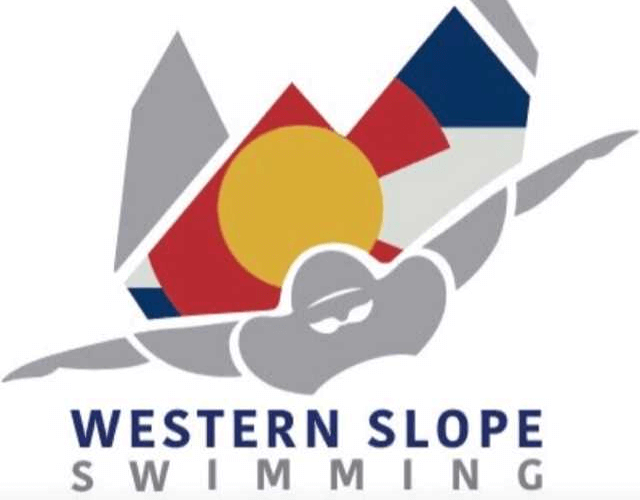
Photo Courtesy: Western Slope League
All commentaries are the opinion of the author and do not necessarily reflect the views of Swimming World Magazine nor its staff.




Great article Bailey! Thanks for highlighting our very special camp and larger community we have on the Western Slope!
Ian MacLaren
Tonya Duran Yates
Great article Bailey❤️❤️❤️
Nice Bailey! Thanks for capturing the spirit of WSL swimming. We are all very lucky to be part of that community.